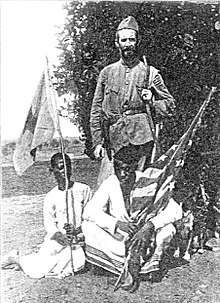Richard Mohun
| Richard D Mohun | |
|---|---|

Mohun in the Congo c.1895. Seated at right is Sergeant Omari bo Hamise.
|
|
| Born | April 12, 1864 Washington, D.C., United States |
| Died | July 13, 1915 (aged 51) Royal Oak, Maryland, United States |
| Occupation | Explorer and soldier of fortune |
Richard Dorsey Loraine Mohun (April 12, 1864 – July 13, 1915) was an American explorer, diplomat, mineral prospector and mercenary. Mohun worked for the United States government as a commercial agent in Angola and the Congo Free State. During his time as commercial agent, he volunteered to command a unit of Belgian artillery in a campaign to force Arab slavers from the colony.
Mohun remained in the service of the US government during this time and was subsequently posted as consul to Zanzibar. In this capacity, he was called upon to act as an intermediary between the combatants in the Anglo-Zanzibar War. Following the conclusion of his three-year posting, Mohun returned to the Congo to prospect for minerals, and later worked with the Belgian authorities.
His most ambitious undertaking was a three-year expedition, beginning in 1898, that laid a telegraph line from Lake Tanganyika to Stanley Falls. He then spent some time prospecting in South Africa before returning to the Congo to reform the Abir Congo Company on behalf of Leopold II of Belgium.
Richard Dorsey Mohun was born in Washington, D.C. on April 12, 1864. Mohun's family had a long association with Africa - his grandfather, William McKenny, had been a prominent figure during the colonisation of the continent and built up a comprehensive collection of photographs during his time there. Mohun, who was privately tutored at the family home, is known to have seen these photographs whilst growing up. Mohun developed an interest in the slave trade, which continued under Arab control in Eastern and Southern Africa, and became the fourth member of his family to campaign for its eradication. Mohun's sister, Lee intended to train as a nun to join a Catholic mission in the Congo, where the slavers were active, and was only dissuaded by her family who asked her to minister to African-Americans in Washington instead.
...
Wikipedia
